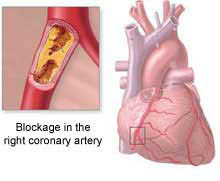Health Topic: Heart Disease
Definition
Heart disease is any disorder that affects the heart's ability to
function normally. The most common cause of heart disease is narrowing
or blockage of the coronary arteries, which supply blood to the
heart itself. This happens slowly over time.
Some heart diseases can be present at birth; these are known as
congenital heart diseases.
Other causes include the following:
- Hypertension
- Abnormal function of the heart valves
- Abnormal electrical rhythm of the heart
- Weakening of the heart's pumping function caused by infection
or toxins
- Various forms of heart disease include:
- Alcoholic cardiomyopathy
- Aortic regurgitation
- Aortic stenosis
- Arrhythmias
- Cardiogenic shock
- Congenital heart disease
- Coronary artery disease (CAD)
- Dilated cardiomyopathy
- Endocarditis
- Heart attack (myocardial infarction)
- Heart failure
- Heart tumor
- Hypertrophic cardiomyopathy
- Idiopathic cardiomyopathy
- Ischemic cardiomyopathy
- Acute mitral regurgitation
- Chronic mitral regurgitation
- Mitral stenosis
- Mitral valve prolapse
- Peripartum cardiomyopathy
- Pulmonary stenosis
- Stable angina
- Unstable angina
- Tricuspid regurgitation
|

